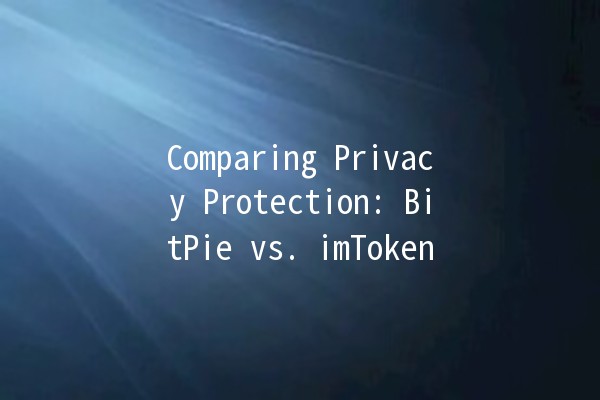




In today's digital age, privacy protection is essential, especially when it comes to managing cryptocurrencies. BitPie and imToken are two popular wallet options that offer various features tailored to user needs. This article delves into the privacy protection capabilities of these platforms, highlighting their strengths and weaknesses, ultimately guiding users in selecting the right option for their needs.
Before diving into the comparison, it’s important to understand what privacy means in the context of cryptocurrency wallets. Privacy in this domain refers to the mechanisms and practices that protect user data and transaction details from being publicly accessible or tracked.

BitPie is a multicurrency wallet focusing on user experience and security. It allows users to manage various digital assets and provides features intended to protect user privacy.
Anonymous Transactions: Users can send and receive funds without linking their wallet to personal information, making it ideal for those who value privacy.
Builtin Security Measures: With regular updates and security enhancements, users benefit from ongoing improvements in privacy protection.
BitPie’s intuitive user interface makes it accessible even for beginners. The wallet's design promotes user engagement while emphasizing the importance of privacy, ensuring users feel secure while managing their assets.
imToken is another widelyused cryptocurrency wallet that offers several advanced features focused on security and user privacy.
Full Control Over Assets: As a noncustodial wallet, imToken allows users to manage their funds without relying on third parties, significantly enhancing privacy.
Secure Key Management: By integrating with hardware wallets, users can store their private keys offline, minimizing the risk of hacks.
imToken is known for its robust platform that balances advanced features with userfriendliness. Users can navigate the wallet effortlessly while maintaining control over their privacy settings.
To facilitate a clear understanding of how BitPie and imToken stack up against each other, we analyze their privacy protocols sidebyside.
| Feature | BitPie | imToken |
||||
| Decentralization | Yes | Yes |
| Anonymous Transactions | Yes | Yes |
| NonCustodial Structure | No | Yes |
| Hardware Wallet Support | Limited | Yes |
| Data Encryption | High (AES256 encryption) | High (AES256 encryption) |
| User Control | Restricted | Full control over private keys |
To maximize privacy protection while using cryptocurrency wallets like BitPie and imToken, consider the following productivity tips:
Description: Integrate hardware wallets with your software wallet to enhance security and protect private keys.
Example: imToken supports integration with various hardware wallets, providing an additional layer of security for your assets.
Description: Utilize twofactor authentication to add an extra layer of protection to your wallet.
Example: Both wallets may offer options to set up 2FA, ensuring that unauthorized access is less likely.
Description: Keep your wallet software up to date to benefit from the latest security patches and privacy enhancements.
Example: Regularly check for updates within BitPie and imToken, ensuring that your wallet runs on the latest version.
Description: Avoid accessing your cryptocurrency wallet via public WiFi to minimize the risk of data interception.
Example: When managing your assets, use a secure network to enhance your privacy.
Description: Stay informed about the latest privacy practices and threats in the cryptocurrency space.
Example: Follow reputable blogs or forums that focus on cryptocurrency and privacy to keep abreast of new developments.
Answer: The key difference lies in their structures: BitPie does not offer a noncustodial approach, meaning that users do not have full control over their private keys. In contrast, imToken is fully noncustodial, ensuring users retain complete custody of their assets.
Answer: Both wallets implement strong encryption methods to secure user data. However, because imToken supports hardware wallets, it offers an additional layer of security that can protect users from online threats better than BitPie does.
Answer: Yes, users can hold both wallets concurrently if they prefer the unique features of each. Managing different wallets can give users flexibility and an opportunity to benefit from the various privacy features offered.
Answer: Decentralization ensures that there is no single point of control or failure, reducing the risk of data breaches or hacks. Both BitPie and imToken utilize decentralized systems, which enhance privacy by making user data less accessible to attackers.
Answer: When selecting a wallet, prioritize noncustodial structures, hardware wallet support, user control over private keys, and the ability to ensure anonymous transactions. Consider how each wallet aligns with your privacy needs and preferences.
Answer: While anonymous transactions improve user privacy, they can raise concerns regarding regulatory compliance. Users should balance their desire for anonymity with the potential implications of anonymity in their jurisdiction.
When choosing between BitPie and imToken, it’s crucial to reflect on your personal privacy needs. Does priority lie in anonymity or complete control? Each wallet provides a unique approach to privacy, catering to different users and priorities. Ultimately, understanding these aspects will guide your decisionmaking process in selecting the right cryptocurrency wallet.
With privacy protection becoming increasingly vital in the digital world, both BitPie and imToken present unique strengths and weaknesses. By selecting a wallet that aligns with your privacy needs and utilizing best practices, you can navigate the cryptocurrency landscape securely and confidently.